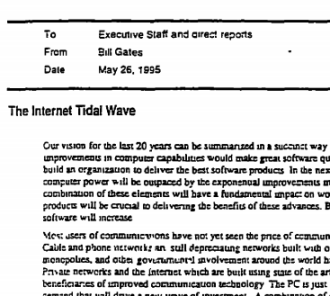
“I assign the Internet the highest level of importance. In this memo I want to make clear that our focus on the Internet is crucial to every part of our business. The Internet is the most important single development to come along since the IBM PC was introduced in 1981.”
The memo runs more than 5300 words and includes highly detailed product plans across all of Microsoft. In retrospect, it probably wasn’t a genius move to be so transparent – the memo became public during the US Dept. of Justice action against Microsoft in the late 1990s.
It strikes me that Larry Page at Google could have written such a memo to all Googlers last year. Of course, Page and his advisors must have learned from Microsoft’s mistakes, and certainly don’t want a declarative memo floating around the vast clouds of Internet eternity. Bad things can happen from direct mandates such as those made by Gates – in the memo he mentions that Microsoft must “match and beat” Netscape, for example, words that came back to haunt him during the DOJ action.
Here’s what Page might have written to his staff in 2011, with just a few words shifted:
” I assign social networking the highest level of importance. In this memo I want to make clear that our focus on social networking is crucial to every part of our business. Social networking is the most important single development to come along since Google was introduced in 1998.”
I very much doubt Page wrote anywhere that Google must “match and beat” Facebook. And unlike Gates, he probably did not pen detailed memos about integrating Google+ into all of Google’s products (as Gates did – for pages – declaring that Microsoft must integrate the Internet into all of its core products.)
But it’s certainly not lost on any Googler how important “social” is to the company: all of their bonuses were tied to social last year.
So why am I bringing this up now? Well, I’ve got no news hook. I’m just doing research for the book, and came across the memo, and its tone and urgency struck a familiar note. The furor around Search Plus Your World has died down, but it left a bad taste in a lot of folks’ mouths. But put in the context of “existential threat,” it’s easier to understand why Google did what it did.
Unlike the Internet, which was a freely accessible resource that any company could incorporate into its products and services, to date “social” has been dominated by one company, a company that Google has been unable to work with. Imagine if, when Gates wrote his Tidal Wave memo, the “Internet” he spoke of was controlled entirely by, say, MCI, and that Microsoft was unable to secure a deal to get all that Internet goodness into its future products.
That seems to be where Google finds itself, at least by its own reckoning. To continue being a great search engine, it needs the identity and relationship data found, for the most part, behind Facebook’s walls.
I’ve written elsewhere about the breakdown of the open web, the move toward more “walled gardens of data,” and what that does to Google’s ability to execute its core business of search. And it’s not just social – readers have sent me tons of information that predict how mobile, in particular, will escape the traditional reaches of Google’s spidering business model. I hope to pore through that information and post more here, but for now, it’s worth reading a bit of history to put Google’s moves into broader context.
